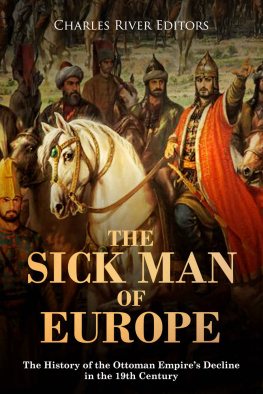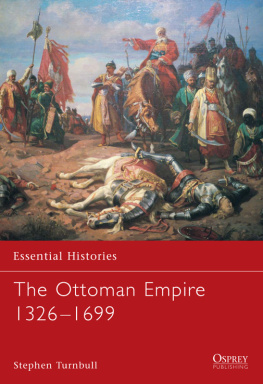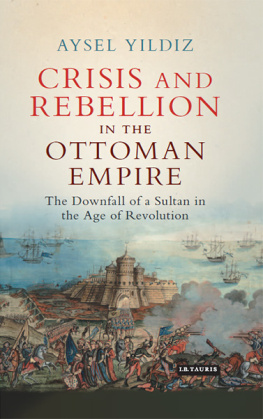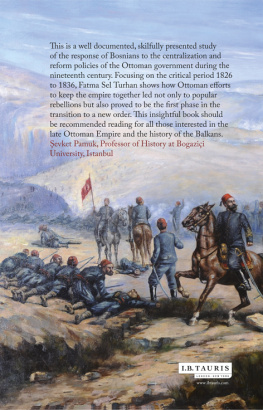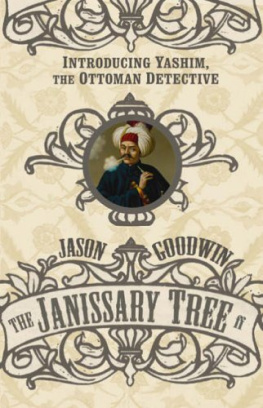Godfrey Goodwin
THE JANISSARIES


The rebuilding of the fortress at Kars by Lala Mustafa Pasha, 1570 (British Library)
To Gillian

Jacques de Hay: janissary (Maggs)
Contents
Illustrations
Acknowledgements
I have to thank my family and friends for putting up with the janissaries for so long and for their encouragement. I have also to thank Dr Richard Luckett, librarian of the Pepys Library, Professor John Carswell of Sothebys, Hugh Bett of Maggs and Graeme Gardiner for their help with the illustrations. Once again, Jana Gough has been an indomitable editor and Andr Gaspard continues to be the most equitable of publishers. I must also thank the janissaries themselves, a million or two of them, without whom the great architecture of the Ottomans would never have been accomplished. The mosque of Sleyman the Magnificent is their enduring memorial.
Genealogy of the Sultans of the House of Osman

A Note on Pronunciation
The spelling adopted here is based on modern Turkish but I have even taken liberties with that.
While the pronunciation list may be of some help, the glossary will only please the benign: it would need an extra chapter to cover all the changing nuances of the meaning of words and the nature of various office-holders duties over 500 years.
All Turkish letters are pronounced as in English except for the following:
c pronounced j as in jam
pronounced ch as in child
not pronounced; lengthens the preceding vowel
akin to the pronunciation of u in radium
pronounced as in the German Knig
akin to the sh in shark
pronounced u as in the French tu
Glossary
abd : slave of Allah
acemiolan : janissary recruit; cadet
agha : general; senior post-holder
ahi : (akhi) member of thirteenth- and fourteenth-century guilds of young lite
ake : silver coin long used in the Ottoman Empire
aknc : light cavalry; scout; light horse
alaybey : senior officer of the sipahis
Albigensians: heretical sect in the Middle Ages
Alevi: Shiite sectarian
acba : senior Royal Cook
askeri : military; infantry; auxiliaries
atecba : Chief Cook
ayan (pl.): local chieftains
azap : infantry (later gunners); could also serve at sea
baba : head of dervish sect
bailo : Venetian ambassador to the sultan
bayram : Muslim religious holiday
bey : (originally) ruler, chieftain; (then) man of rank; (now) any man
beylerbey : lord of lords; viceroy
Bogomil: Balkan follower of Albigensian heresy
blk : 61 out of the 196 companies of the janissary corps
blkba : captain; sergeant
bostanc : gardener; division of janissaries
bostancba : pasha of the bostancs
boza : drink of fermented barley
caliph: successor to the Prophet
ardak orba : commandant of the Customs House
avu equerry; gate-keeper; usher
cebeci : armourer
celal : rebels made up of dervishes, disbanded soldiers, students and the dispossessed
celeb : sheep-driver
elebi : title of member of lite class; baba or master of a Bektai tekke
cemaat : 101 out of the 196 companies of the janissary corps
orba : janissary colonel
defterdar : Keeper of the Account Books; Minister of Finance
deli: maniac (hence shock trooper)
derbent (pl.): guardians of the passes; local recruits
dervish: member of a mystical sect
devirme : Christian levy
divan : general council
Divan: Grand Council of State
dizdar : commandant of a fortress
Enderun Kolej: (College Within), Palace School
esnaf (pl.): guildsmen; traders
fetva (pl. fetvalar) : legal ruling with the force of an edict
firman : edict; order-in-council; command
gazi : warrior fighting for Islam/for the Faith
ghulam : royal cadet; slave held by title deed
gzde : chosen girl
greba : foreign division
hadith : sayings of the Prophet, remembered by his followers after his death and seen as the ordinances of Allah
hajj : pilgrimage to Mecca
hamam : Turkish bath
han : inn
hass : royal estate
hoca : teacher; tutor and chaplain
horsetails: symbols of high-ranking commanders
iolan : page studying at Enderun Kolej
imam : prayer leader
irade : imperial rescript, decree
jerid : sport of mounted dart-throwing
jihad : Holy War
kad : judge
kadasker : military chief justice of Europe or Asia
kahya : steward
kalafat : crested headdress
kanun : code of civil law
Kanun-i-Terifat: Law of Ceremonies
Kanunname: volume of laws and decrees
kapkul (pl.): members of the imperial household
kapudan paa : Grand Admiral
kervansaray : Turkish spelling of caravanserai
kilim: tapestry-weave rug
Kzlba: Red Heads; Shiites
konak : villa; mansion
ks (pl.): great drums
kul : slave
kul kahya : steward of the imperial household; adjutant of the janissaries, etc.
lala : tutor
medrese : religious college
mescit : small (Ottoman) mosque without a mimber
meydan : square; open space
millet : non-Muslim citizens; their quarter
mimber : pulpit
molla : professor; senior religious and legal dignitary
mderris : rector; professor
muezzin : crier of the Muslim call to prayer
msellem (pl.): settled nomads performing military service in return for smallholding
mteferrika : lite company of royal guard of feudal origin
naghile : hubble-bubble pipe
Nizam i-Cedit: New Army
ocak : barracks; hearth
oda (pl. odalar) : room; barracks; dormitory
odaba : lieutenant
ordu : army; camp
orta : janissary company
otak : imperial tent (lit: high dome)
padiah : sultan
pencik : title-deed, especially to a slave; slave
peyk : foot guardsman
piyade : Anatolian foot soldier
reis efendi : foreign minister
ribat : monastery (often fortified)
alvar (pl.): pantaloons
sancak : flag; division of a province
sancak bey : Lord of the Standard; governor of a small province
Next page

